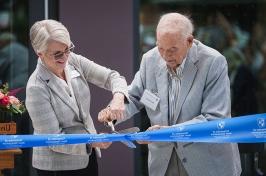
NH CREATES will build on UNH Tech Camp, a set of youth summer programs designed to increase STEM literacy, providing scholarships for under-represented, rural or economically disadvantaged youth to attend.
A major new grant to UNH aims to develop an effective workforce for New Hampshire’s expanding regenerative medicine and biotechnology industries. The project, called NH CREATES the Future: the NH Collaborative for Regenerative Medicine Education and Training for Engineers and Scientists of the Future (NH CREATES), will engage middle and high school teachers and students in Manchester, Nashua, Portsmouth, Dover and Barrington as well as Lawrence, Mass., to develop a pipeline to support the state’s biotechnology workforce needs.
NH CREATES is funded by a Science Education Partnership Award (SEPA) from the National Institute of General Medical Sciences (NIGMS) of the National Institutes of Health.
“NH CREATES is a training mechanism to supply the regenerative medicine and biotechnology industry with an educated workforce pipeline so that, in turn, this burgeoning industry can fulfill its potential to cure disease.”
“NH CREATES is a training mechanism to supply the regenerative medicine and biotechnology industry with an educated workforce pipeline so that, in turn, this burgeoning industry can fulfill its potential to cure disease,” says Carmela Amato-Wierda, associate professor of materials science at UNH and principal investigator on the grant. “We want to educate middle and high school students about regenerative medicine and instill excitement about how we need their future contributions to propel this field forward in the years to come.” Amato-Wierda notes that 78% of New Hampshire’s biotechnology industry reports a shortage of skilled workers, and 25% of the current biotechnology workforce is over the age of 55.
“New Hampshire is a leader in technology and innovation because we know how important it is to invest in STEM learning from an early age. This grant is a testament to the diligence of our higher education institutions to make good on that effort and build out a 21st century workforce,” said the New Hampshire congressional delegation. “We are excited to see the University of New Hampshire receive this award and are thrilled for students and their educators in Manchester, Nashua, Portsmouth, Dover and Barrington who will have the opportunity to participate in this program. We will continue to advocate for federal funding that boosts our state profile in technological discovery and empowers the next generation of New Hampshire scientists and engineers.”
NH CREATES will facilitate collaboration action among middle and high schools, higher education and the region’s biotechnology industry — including the Advanced Regenerative Manufacturing Institute (ARMI), the Manchester-based national hub for the regenerative medicine and biotechnology industry — to enhance STEM learning and career pathways with several initiatives.
A two-week summer institute will provide teacher training to middle and high school teachers to develop and deliver formal curriculum about core biomedical concepts relevant to regenerative medicine and biotechnology. “The best way to educate students is to invite their teachers into the conversation and collaboratively work with them,” says Amato-Wierda.
In addition, NH CREATES will build on UNH Tech Camp, a set of youth summer programs designed to increase STEM literacy that have been directed by Amato-Wierda since 2015. The new grant will provide scholarships for 40 under-represented, rural or economically disadvantaged youth each year.
Finally, the grant aims to create a biotechnology STEM ecosystem in which industry, higher education and K-12 partners work collaboratively to assist students as they work their way from middle school to high school to college to biotechnology careers.
The five-year SEPA grant, for $1.2 million, will bring enhanced STEM education to up to 1,400 students each year from the state’s most ethnically diverse school districts. NH CREATES will also recruit from the Lawrence (Mass.) Family Development Charter School, which is 100% Latinx and has a multiyear partnership with UNH Tech Camp.
NH CREATES will engage faculty and staff from higher education institutions across the state to advise teachers participating in the summer institute. Kelley Thomas, the Hubbard Professor of Genomics at UNH and director of UNH’s Hubbard Center for Genome Studies, is co-principal investigator. Thomas also directs the bioinformatics and genomics core of NH-INBRE (IDeA Network of Biomedical Research Excellence), a NIGMS-sponsored network of biomedical research and research training in New Hampshire. Faculty from NH-INBRE institutions across the state are involved, including faculty from UNH’s Durham and Manchester campuses, Keene State College, Dartmouth College, and Franklin Pierce University.
-
Written By:
Beth Potier | UNH Marketing | beth.potier@bjlanjia.com | 2-1566



















































